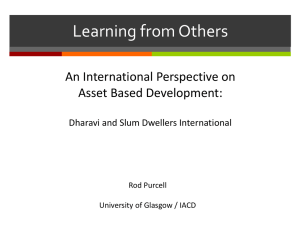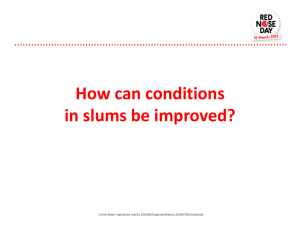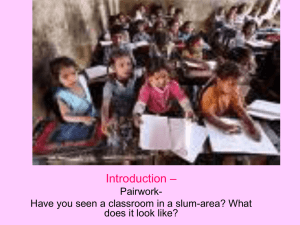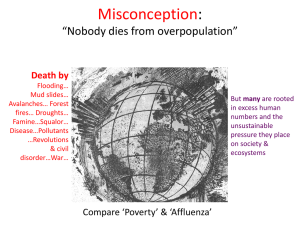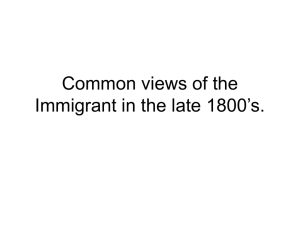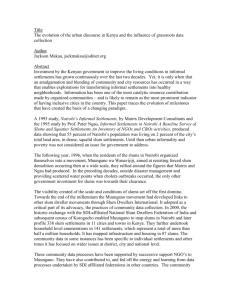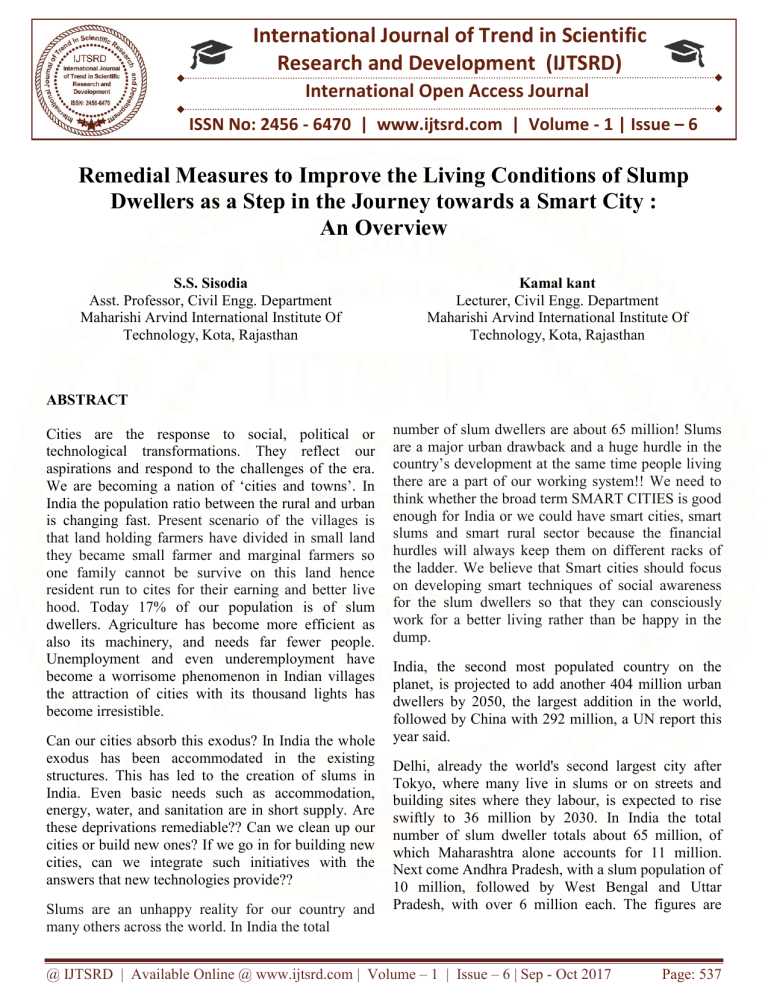
International Journal of Trend in Scientific
Research and Development (IJTSRD)
International Open Access Journal
ISSN No: 2456 - 6470 | www.ijtsrd.com | Volume - 1 | Issue – 6
Remedial Measures to Improve the Living Conditions of Slump
Dwellers as a Step in the Journey towards a Smart City :
An Overview
S.S. Sisodia
Asst. Professor, Civil Engg. Department
Maharishi Arvind International Institute Of
Technology, Kota, Rajasthan
Kamal kant
Lecturer, Civil Engg. Department
Maharishi Arvind International Institute Of
Technology, Kota, Rajasthan
ABSTRACT
Cities are the response to social, political or
technological transformations. They reflect our
aspirations and respond to the challenges of the era.
We are becoming a nation of ‘cities and towns’. In
India the population ratio between the rural and urban
is changing fast. Present scenario of the villages is
that land holding farmers have divided in small land
they became small farmer and marginal farmers so
one family cannot be survive on this land hence
resident run to cites for their earning and better live
hood. Today 17% of our population is of slum
dwellers. Agriculture has become more efficient as
also its machinery, and needs far fewer people.
Unemployment and even underemployment have
become a worrisome phenomenon in Indian villages
the attraction of cities with its thousand lights has
become irresistible.
Can our cities absorb this exodus? In India the whole
exodus has been accommodated in the existing
structures. This has led to the creation of slums in
India. Even basic needs such as accommodation,
energy, water, and sanitation are in short supply. Are
these deprivations remediable?? Can we clean up our
cities or build new ones? If we go in for building new
cities, can we integrate such initiatives with the
answers that new technologies provide??
Slums are an unhappy reality for our country and
many others across the world. In India the total
number of slum dwellers are about 65 million! Slums
are a major urban drawback and a huge hurdle in the
country’s development at the same time people living
there are a part of our working system!! We need to
think whether the broad term SMART CITIES is good
enough for India or we could have smart cities, smart
slums and smart rural sector because the financial
hurdles will always keep them on different racks of
the ladder. We believe that Smart cities should focus
on developing smart techniques of social awareness
for the slum dwellers so that they can consciously
work for a better living rather than be happy in the
dump.
India, the second most populated country on the
planet, is projected to add another 404 million urban
dwellers by 2050, the largest addition in the world,
followed by China with 292 million, a UN report this
year said.
Delhi, already the world's second largest city after
Tokyo, where many live in slums or on streets and
building sites where they labour, is expected to rise
swiftly to 36 million by 2030. In India the total
number of slum dweller totals about 65 million, of
which Maharashtra alone accounts for 11 million.
Next come Andhra Pradesh, with a slum population of
10 million, followed by West Bengal and Uttar
Pradesh, with over 6 million each. The figures are
@ IJTSRD | Available Online @ www.ijtsrd.com | Volume – 1 | Issue – 6 | Sep - Oct 2017
Page: 537
International Journal of Trend in Scientific Research and Development (IJTSRD) ISSN: 2456-6470
indeed staggering. Slums are a major urban drawback
and a huge hurdle in the country’s development
Modiji’s pledge to build 100 “smart” cities as part of
an ambitious agenda of reform and economic
development has millions flocking from the
countryside in search of jobs and stretching some
cities to near breaking point and pushing the poor
further into the outskirts
The predicted new cities would give rise to exclusive
so-called gated communities, while the poor remained
squeezed into ever-growing and sometimes illegally
built slums with few services.
“There are a large number of people who want to
move out of poverty, to move out of the slums, but
they don't know how. We are not focusing on that.
There is a strong need for awareness programmes for
slum dwellers telling them how they can make their
lives better, how shifting to a low cost housing would
not mean loss of work, make them aware of better
transportation network, how to use facilities
government provides for them, as most of them are
illiterate and don’t even know that there are certain
benefit programmes which are there for their
betterment.
Slum dweller kumar in delhi states that he has seen
the city grow over the past 17 years he has been
staying in the slum where he has seen flyovers and a
metro develop. He feels their state in the slum has
deteriorated and population has grown. His two room
shack along with hundreds of others was suddenly
demolished recently for encroaching on state forest
land. Is demolition of slums a solution??
Smart cities should have a chalked out agenda for
educating the slum dwellers , understanding the fears
that they face and working on them. A govt
committee should be formed who can actually do a
survey to find out why even after relocating them the
slum dwellers come back to the streets.We finally
need to cross their mental barriers to be able to
physically relocate them successfully.
Personally having spoken to a few dwellers staying
under the over bridge under extremely unhygienic
conditions do not want to go and stay in any govt
shelter as they feel they will be restricted from a lot
their daily activities and they love it here.
A complete analysis of what kind of work they do
listing each and every little one , what are their
activities morning to evening , their source of
entertainment , what they do for their sanitation and
finally how many are literate and the ratio of children
not going to school.
Till the time each activity is not understood and a
provision made for everything that they would
actually need for their livelihood
Identify Problems in Slums Areas
Within a slum problems are manifold: living
conditions are deplorable, crime rate is high,
sanitation is poor, child mortality is high, education
levels are low and diseases are rampant. But the
situation has to be tackled and the issues have to be
faced.
CONCLUSION
Provision of tenancy rights to slum dwellers in order
to ensure that their housing is not infringed upon by
government agencies. Slum dwellers often fear
rehabilitation because it affects their access to means
of livelihood. The idea behind ensuring tenure is that
once they lose their fear of being evicted, the slum
dwellers can work to improve their quality of life. In
due course they can purchase the land they currently
inhabit.
Building low-cost residences for slum dwellers so
that proper housing can ensure their safety and
hygiene
Making clean water available
Encouraging proper sanitation and waste
management
Controlling pollution levels
Providing transport facilities
Arranging for informal education
Making credit and finance available as per
requirement
Introducing new programmes for incomegeneration
Providing a platform for sharing ideas, inputs and
experiences
Facilities for Small industries should be providing so
that self employment may be generated at town level.
Similarly improvement agriculture technique is given
to improve the production of the agriculture latest
high breed seeds should be provide as well as required
weedicide, pesticides. So that production of
agriculture could not be hampered.
@ IJTSRD | Available Online @ www.ijtsrd.com | Volume – 1 | Issue – 6 | Sep - Oct 2017
Page: 538
International Journal of Trend in Scientific Research and Development (IJTSRD) ISSN: 2456-6470
However, these are only broad guidelines and there
can be no single uniform model for urban planning
which can be used globally. Slum rehabilitation and
upgrading are vital, but each city has certain
distinctive political, cultural, environmental and
economic factors which determine the extent to which
such rehabilitation is feasible. Hence, proper
assessment has to be made and prospects evaluated
before the problem can be addressed. Slum dwellers
need to made aware of the need for improvement in
living conditions, and they must readily involve
themselves with every phase of the rehabilitation.
Practical and innovative approaches need to be put
into practice to integrate slums within the
cities. Governments need to pay more attention to
slums and make concerted attempts to address this
problem proactively. One-seventh of the world’s
population is in slums right now. It is indeed time for
urgent action. Why can we not hear the alarm bell
ring?
REFERENCES
1) https://www.ritimo.org/Slum-Settlements-onRailway-Land-A-State-of-Denial-and-Deprivation
2) Census
Data 2011
(Government
of
India)
Human Development Report on Bombay
Municipal Corporation by the United Nations
Development Programme
RTIs filed to RLDA and the Ministry of Railways,
India.
3) Government of India
Ministry of Urban Development (June, 2015)
4) NAGAR NIGAM KOTA (RAJASTHAN)
5) http://timesofindia.indiatimes.com/india
@ IJTSRD | Available Online @ www.ijtsrd.com | Volume – 1 | Issue – 6 | Sep - Oct 2017
Page: 539

